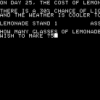I'm trying to decide how to handle multiple card outcomes in a competitive/coop survival game.
The traditional way would be to roll a d6 and consult a chart on the card. The roll determines the outcome, and this works fine but it means the outcome is based on chance.
Another Idea would be each outcome has a colour mark beside it lets say black, red, blue, white. At the start of each turn the player chooses or is assigned a number of coloured tokens and they can spend those tokens to decide the outcome of events. This way the player is making the choice on what outcomes they receive at least initially but if they receive a number of encounters on a single turn they may have no choice but to take a bad outcome if they've already spent the tokens that would give a good outcome. (There could be a help mechanic here where another player can give them a token from their supply)
The third idea I have is the conspiracy idea. A player encounters an event it has colour coded outcomes as above but the other player vote in secret placing a face down colour marker which are then revealed to determine the outcome for the player. Whichever outcome the group decided on is the one you get.
Fourth.... I don't really know one player decides in secret.
Fifth.... you can choose to roll or any player can spend a token to decide your fate instead of the die.
So for example let’s say you have the event
Military Cargo Crate
While wandering through the wasteland you discover an intact military cargo crate.
Pay 1 Computer Code to draw a random gear card
Or
Attempt to Hack the Lock
1 (red) - The crate is rigged and explodes causing 1 wound.
2-3 (white) - Despite your best efforts you can’t get it open.
4-5 (blue) - No puny lock is a match for you, you gain a random gear card.
6 (black) – With your skills you not only unlock the crate but salvage the explosive. Gain an explosive and 1 random gear card.
Or the event
Half Empty Whisky Bottle
Its whiskey not great whiskey but good enough to share.
Choose another player you both draw 1 story card
Then
4+ (white) - There is enough for a second round you and player of your choice draw a story card.













